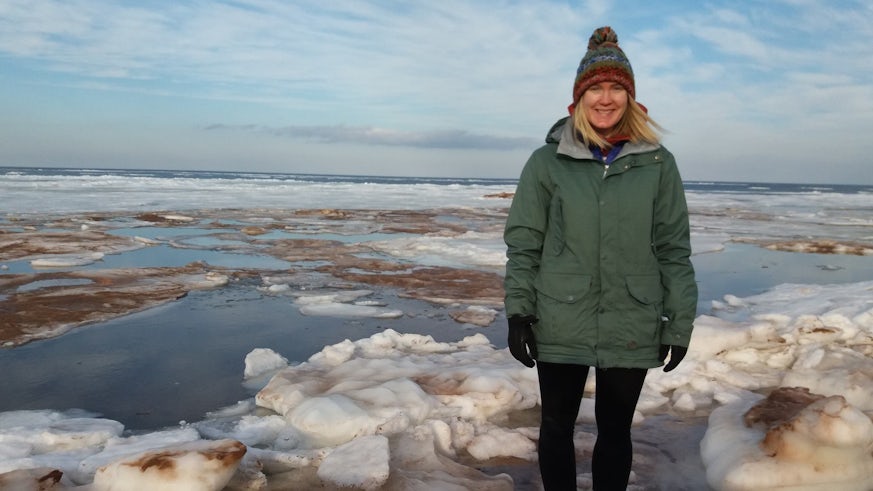‘There’s this whole unknown and hidden world inside all of us – and it can tell us so much’
16 December 2020

When Sophie Watson tells family and friends what she does for a living she tends to keep it simple; “I just say I work with polar bears and wolverines.”
The reality is a little more unusual.
Sophie studies the bacteria and parasites found in the guts of Arctic animals to see what we can learn about these species and their environment. And it turns out we can learn quite a lot.
“There’s this whole unknown and hidden world inside these animals – inside all of us – and it can tell us so much,” says Sophie, a research student at Cardiff University’s School of Biosciences.
“The gut is a mini ecosystem of its own and the bacteria and parasites living here are fundamental to the health - both good and bad - of these animals. They can give us so much insight into their lives and the world around us.
“They’re so important and yet there’s so much we don’t yet know about these micro-environments.
“It might sound very strange – but I think it’s awesome.”
The Arctic is the northernmost region on earth and includes parts of Scandinavia, Russia, Canada, Greenland and Alaska and studying species in these extremes can act as an important sentinel of climate change, says Sophie.
Her previous research showed that loss of sea ice in the Arctic was associated with differences in the gut bacteria of polar bears; Sophie found differences in the gut microbiota of polar bears that remain out on the sea ice compared to those who have altered their behaviour to come on shore because of their rapidly vanishing habitat.
Changes in communities of gut bacteria can have worrying consequences for the species’ health – and trying to understand more about how polar bears and other species respond to the many impacts of global warming, such as habitat loss or changing diet, is vital.

Her latest research looks at the habits of another Artic species.
Sophie worked with researchers from Cardiff University, two Canadian universities and the government to uncover new information about parasites living inside wolverines.
“In this study we investigated the parasites of wolverines from Nunavut, a region high in the Canadian Arctic. We detected a variety of different parasites, including Baylisascaris devosi, a type of roundworm, and Taenia twitchelli, a tapeworm, both of which haven't been recorded in wolverines since 1978.
“Our research extended the geographic distribution of these parasites in wolverines by 2,000km to the east and into the tundra ecosystem – the more inhospitable and barren landscapes of the Arctic."
The diversity of parasite species we found may reflect the huge distances wolverines can travel and gives insight into the diverse range of prey items they consume.
As global temperatures rise it alters the reproduction and survival of various parasites living inside many species, so it’s crucial to shed light on what is present now so we can see how this may change in the future, says Sophie.
“Monitoring wildlife, particularly in such extreme environments, plays an important role in identifying changes that will hopefully help us to come up with actions that might slow or minimise any impact. This is particularly important in areas like the Arctic where rates of climate change are so fast.”
Sophie was fascinated by nature from a young age and it was a next-door neighbour careers adviser who suggested wildlife research might be an interesting prospect.
She studied Zoology at Cardiff University and then worked on a project to monitor the population growth of grizzly bears in the US by analysing hair from bear rub trees. Encouraged by other female researchers, she went to work in Alaska and realised there was little information about gut disease and parasites in even some of the most iconic Arctic species, including polar bears.
“Many Arctic species were – and still are – at a real tipping point and I was really surprised that so little research had been done in this area despite its importance to health,” she says.

Sophie carried out a masters at Cardiff University and the Fondazione Edmund Mach, Italy, to look at parasites in polar bears, later broadening this out into a PhD looking at the gut microbiota and parasites of many species across the Arctic as a whole.
For Sophie, the combination of studying some of the world’s most rare species in one of the most “magical, pristine and untouched” places which has become an “epicentre for research”, has been the stuff of dreams.
But there is one hitch in her line of work – she has never actually seen the animals she works on.
“I would love to one day see a polar bear or wolverine – maybe one day I will,” she says.
“But it adds to the allure of it and in a way it’s nice because it means these species are in the right place, untouched by humans and living their lives the way they should be.”
The Parasites of an Arctic scavenger; the wolverine (Gulo gulo) was a collaboration with the Université de Moncton, University of Saskatchewan, not-for-profit organisation ArctiConnexion, which works to indigenous arctic communities, and the Government of Nunavut. Sophie's research is supervised by Dr Sarah Perkins from Cardiff University’s School of Biosciences.
Share this story
The School has an international reputation for its teaching and research, and offers some of the top research-led bioscience curricula in the UK.


